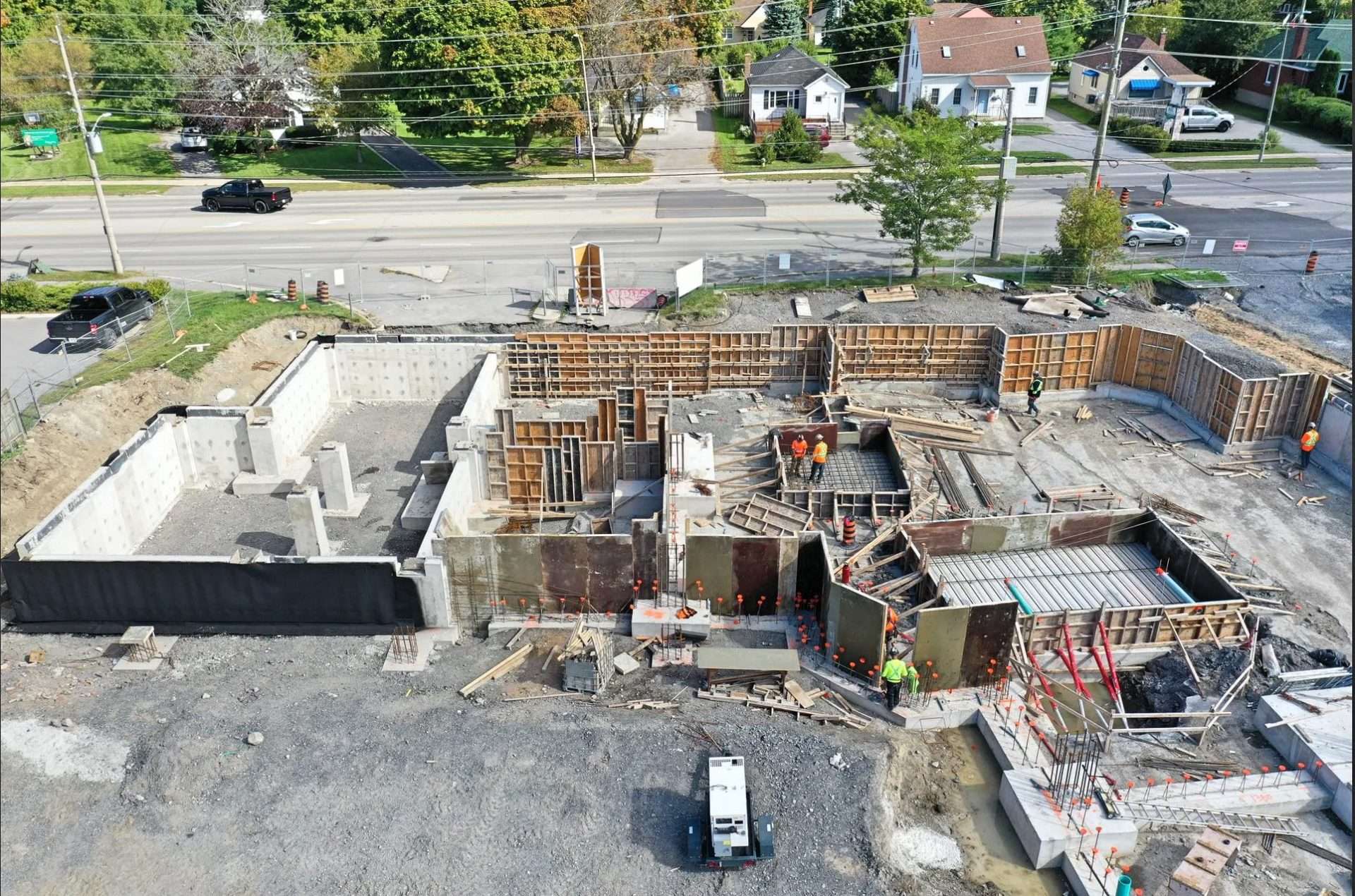
 1316 Princess Street in 2022. Photo via KFHC website.
1316 Princess Street in 2022. Photo via KFHC website. 1316 Princess Street in 2025. Photo via Buttcon website.The Kingston Frontenac Housing Corporation (KFHC) project at 1316 Princess Street was originally slated to open more than 90 new apartments in July 2024, and is now to open in 2025, according to contractor Buttcon’s website.
1316 Princess Street in 2025. Photo via Buttcon website.The Kingston Frontenac Housing Corporation (KFHC) project at 1316 Princess Street was originally slated to open more than 90 new apartments in July 2024, and is now to open in 2025, according to contractor Buttcon’s website.
Residential developers in Kingston will soon be put on notice to ‘use it or lose it.’
The City of Kingston is closing a big loophole when it comes to setting aside enough water and sewer capacity to accommodate future housing developments.
Under the current system, a residential project that gets approved by Council can sit dormant for several years, with no construction occurring, even though the city has factored in water and sewer capacity for that project.
“This means that the servicing capacity that was allocated to that project was not realized, without a formal process established to withdraw and reallocate that capacity,” states a report from Paige Agnew, Commissioner of Growth & Development Services, that will go before Kingston City Council on Tuesday, Jun. 3, 2025.
City officials call it a “major fundamental flaw” in the existing policy, as Council had no authority to force the owner to proceed with approved development in a timely fashion. But the long-standing policy gap is closing because of the province’s current push to fast-track construction of more housing, with a goal to build 1.5 million homes across the province by 2031.
Kingston has endorsed the policy with its own pledge to create 8,000 new homes by 2031.
 The Riverview Shores development in Kingston’s east end will see housing where a former quarry once operated. Photo via Tamarack Homes website.
The Riverview Shores development in Kingston’s east end will see housing where a former quarry once operated. Photo via Tamarack Homes website.
The province’s new law — Bill 185, Cutting the Red Tape to Build More Homes Act — gives municipalities more powers to compel development, or the property owner could risk losing their Municipal Servicing Allocation (MSA), known as the “use it or lose it” system.
City Council is set to pass zoning bylaw amendments, in accordance with Bill 185, that give residential builders with approved projects three years to obtain all building permits, or the water supply and sewage capacity attached to the project will be reallocated to other development applications.
“Failure to obtain full building permits within the established timeline will result in an automatic withdrawal of the allocation,” according to Agnew’s recommendation.
It means developers would have to restart the MSA application process with no guarantee that water and sewer capacity will be available.
City officials say this new process will eliminate a host of past problems that required costly infrastructure upgrades, or prevented other housing projects from proceeding because water-sewer capacity was set aside for someone else.
“In some cases where existing services were constrained, unrealized allocated capacity impacted the ability of other projects to progress and potentially delayed the construction of new homes or businesses for no reason other than the theoretical allocation of capacity to a different project that is not moving forward,” Agnew writes.
Housing projects that took decades to get built also forced the City to scramble to meet the capacity promise that was originally assigned to the development, according to the report.
“In other cases, legacy zoning approvals from more than 20 years ago come forward and require municipalities to complete inefficient, expensive infrastructure upgrades because capacity connected to those legacy approvals was not protected in the system for that extended period of time,” she explains.
Kingston’s water, sewer and hydro systems do not have infinite capacity. The Cataraqui Bay Wastewater Treatment Plant serving the city’s rapidly growing west end is expected to reach capacity by 2029.
 Cataraqui Bay Wastewater Treatment Plant. Photo via Utilities Kingston website.
Cataraqui Bay Wastewater Treatment Plant. Photo via Utilities Kingston website.
Cataraqui Bay last underwent an expansion in 2002. The cost to do another upgrade of the facility isn’t known, but the last estimate in 2014 pegged the work at $6 million. The upgrade was delayed in recent years while Utilities Kingston explored, and ultimately rejected, the feasibility of building a biogas plant to convert sewage sludge into natural gas.
And, a recent report to Council noted Kingston’s hydro substations are also nearing capacity within the next few years, and a new substation must be built to ensure there’s enough electricity to accommodate future growth.
As Agnew’s report states: “Without available capacity in municipal services, new development cannot be built and the housing crisis will continue without new housing supply to meet the growing demand.”
The full agenda for the upcoming meeting of Kingston City Council can be read on the City’s website. The meeting will start at 7 p.m. on Tuesday evening in the Council Chambers of Kingston City Hall, located at 310 Ontario Street. Meetings can be viewed in person at City Hall, or virtually (during or after the meeting) in the video feature within the relevant Council agenda.






